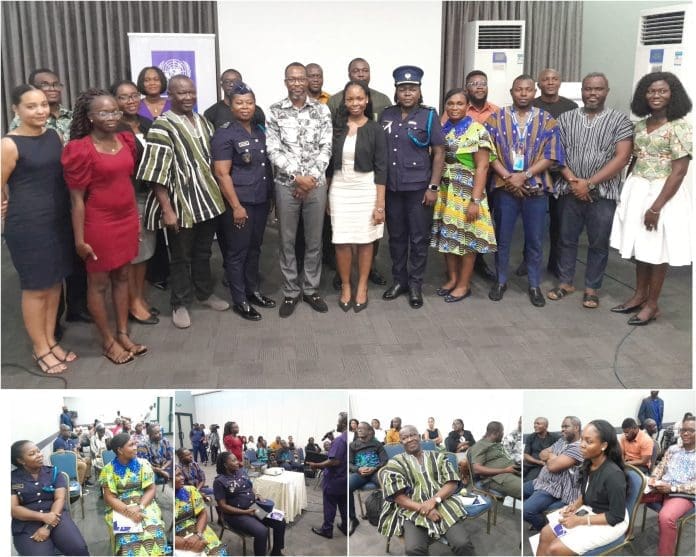A new two-year initiative aimed at bolstering Ghana’s capacity to regulate and enforce standards for cooling appliances and climate-damaging hydrofluorocarbons (HFCs) has officially been launched. The project, titled the “Deliver Training Programme for the Implementation of New Regulations on Cooling Appliances and Hydrofluorocarbons Project,” held its inception meeting in Accra on Friday.
The initiative is a partnership between the United Nations Development Programme (UNDP), the Energy Commission, and the Environmental Protection Authority (EPA), with vital funding from the Climate and Clean Air Coalition (CCAC) of the United Nations Environment Programme (UNEP).
Strengthening Enforcement for Climate Action
The core goal of the “Deliver Training Programme” is to strengthen the enforcement capabilities of key government agencies. Through targeted training and nationwide awareness campaigns, the project will enhance the knowledge of government institutions in implementing Minimum Energy Performance Standards (MEPS). This move is designed to ensure the effective management of HFCs—potent greenhouse gases—while simultaneously driving energy efficiency across the country.
Dr. Saeed Abdul-Razak, Head of Environment & Climate at UNDP Ghana, emphasized the initiative’s significance during his opening remarks at the inception workshop.
“This initiative stands as clear evidence of the power of partnership, collective effort, and shared commitment to advancing sustainable development and energy efficiency,” Dr. Abdul-Razak stated. He extended appreciation to the Energy Commission, EPA, and the Ministry of Environment, Science, Technology and Innovation for their collaboration in designing and overseeing the project.
Addressing Ghana’s Rising Energy Demand
The launch comes amid a globally escalating demand for energy, which Dr. Abdul-Razak noted is being driven by rising global temperatures, rapid urbanization, and population growth. He cited the International Energy Agency’s Global Energy Report for 2025, which highlighted that emerging economies like Ghana accounted for over 80% of the recent 2.2% global energy demand growth in 2024.
“This underscores the urgent need for coherent and effective measures that touch all segments of society, as energy remains the backbone for development,” he stressed.
The project will directly support the Government of Ghana’s Nationally Determined Contributions (NDCs) under the Paris Agreement by ensuring that only modern, energy-efficient cooling appliances are imported, used, and disposed of responsibly.
“By prioritizing energy efficiency, we are achieving multiple benefits: we are not only reducing greenhouse gas emissions but also cutting energy costs for consumers and enhancing the nation’s energy security,” Dr. Abdul-Razak added.
Key Stakeholders Converge
The inception meeting served as a platform to engage key stakeholders, ensuring a common understanding of expected project outputs and facilitating clear roles and responsibilities for implementation.
Participants were drawn from a wide array of institutions, reflecting the project’s multi-sectoral importance. Attendees included representatives from the Ghana Revenue Authority (Customs Division), the Ghana Standards Authority, the Office of the Minister of Climate Change and Sustainability (Office of the President), the Ministry of Energy & Green Transition, and the Ministry of Trade, Agribusiness and Industry, among others.
Dr. Abdul-Razak concluded by calling for sustained cooperation, stating, “Success, however, requires collaboration across all sectors: government, the private sector, development partners, and local communities must work together to innovate, implement, and scale solutions.”
The “Deliver Training Programme” is set to run for two years, aiming to create a cleaner, greener, and more energy-secure future for Ghana.
1. Introduction/Background
TERMS OF REFERENCE
Deliver Training Programme for the Implementation of New Regulations on
Cooling Appliances and Hydrofluorocarbons (CCAC)
INCEPTION MEETING
Ghana has implemented robust policy frameworks, notably the National Cooling Action Plan (NCAP) 2021 and the Refrigeration and Air Conditioning (RAC) Roadmap (2022), to guide the transition of the refrigeration and air conditioning industry toward technologies with reduced Global Warming Potential (GWP). The Nationally Determined Contribution (NDC) 2021 reinforces commitments to emission reduction in the RAC sector, with a targeted 70% penetration of very low GWP refrigerants in air conditioners by 2030. To achieve this, the country has revised its Energy Efficiency Standards and Labelling (AirConditioners) (LI 2458)
2022, and Energy Efficiency Standards and Labelling (Refrigeration Appliance) (LI 2441) 2022, to regulate the import of inefficient cooling appliances. This is a targeted effort to ensure efficiency in refrigeration equipment with appropriate refrigerants, in line with the Kigali
Amendment of the Montreal Protocol. Ghana’s regulatory efforts in the RAC sector underscore its dedication to environmental sustainability and energy efficiency.
2. Specific Objectives
To strengthen the capacity of the regulatory and enforcement agencies, UNDP is implementing the “Deliver Training Programme for the Implementation of New Regulations on Cooling Appliances and Hydrofluorocarbons” project with funding from the Climate and Clean Air
Coalition of UNEP. The two-year project from 2025-2027, is in partnership with the Energy Commission and the Environmental Protection Authority. The project aims to enhance knowledge of government institutions, strengthen their enforcement capabilities and enhance awareness in implementing the Minimum Energy Performance Standards (MEPS) towards the effective management of hydrofluorocarbons (HFCs) while ensuring energy efficiency.
UNDP As part of the project implementation processes, an Inception Meeting has been scheduled to take place on 3 October 2025 in Accra, with the objective of engaging key stakeholders on the expected outputs for the project, and to facilitate common understanding on the expected roles and responsibilities of stakeholders for implementation.
The specific objectives of the meeting are; To enhance understanding among stakeholders on the project objectives, targets, and milestones.
To agree on project implementation arangement with key project partners.
To enhance visibility on the project and its overall contribution to energy efficiency in the RAC sector
By Kingsley Asiedu
Source: newsghana.com.gh











